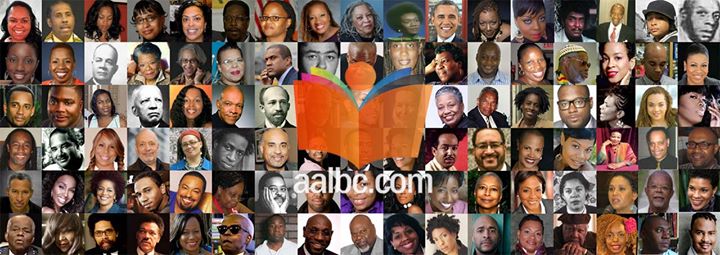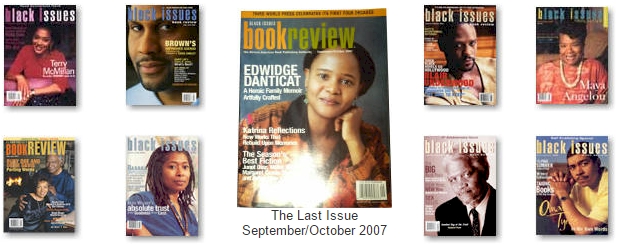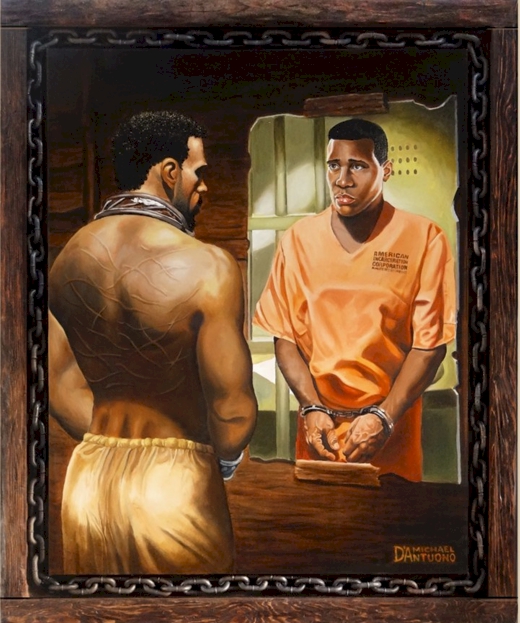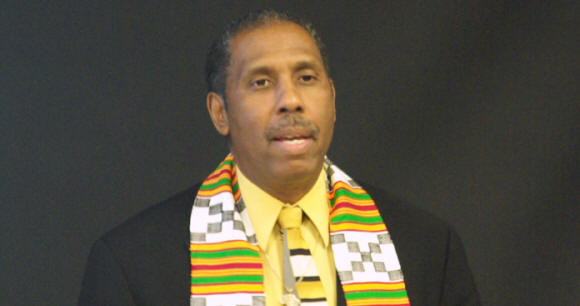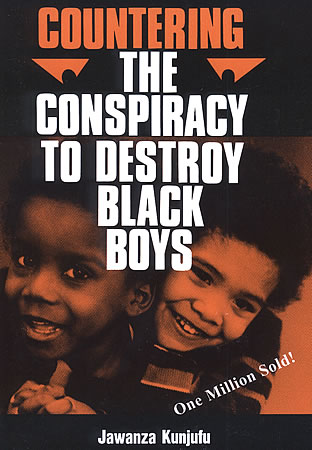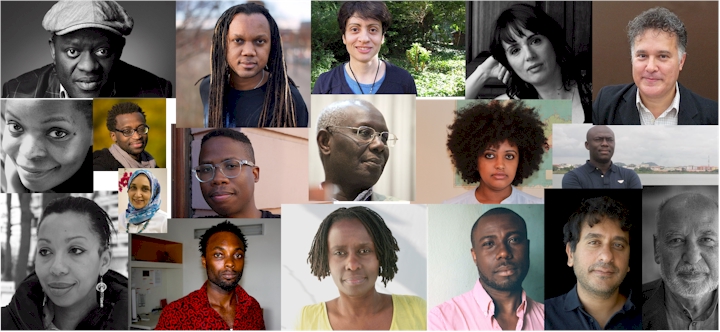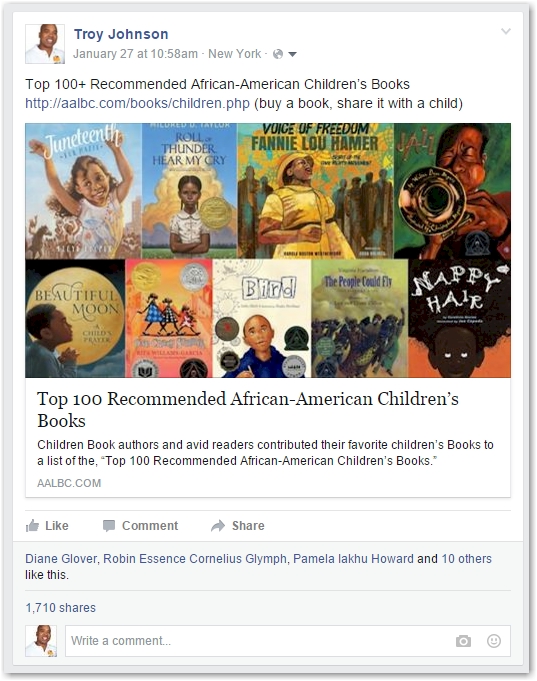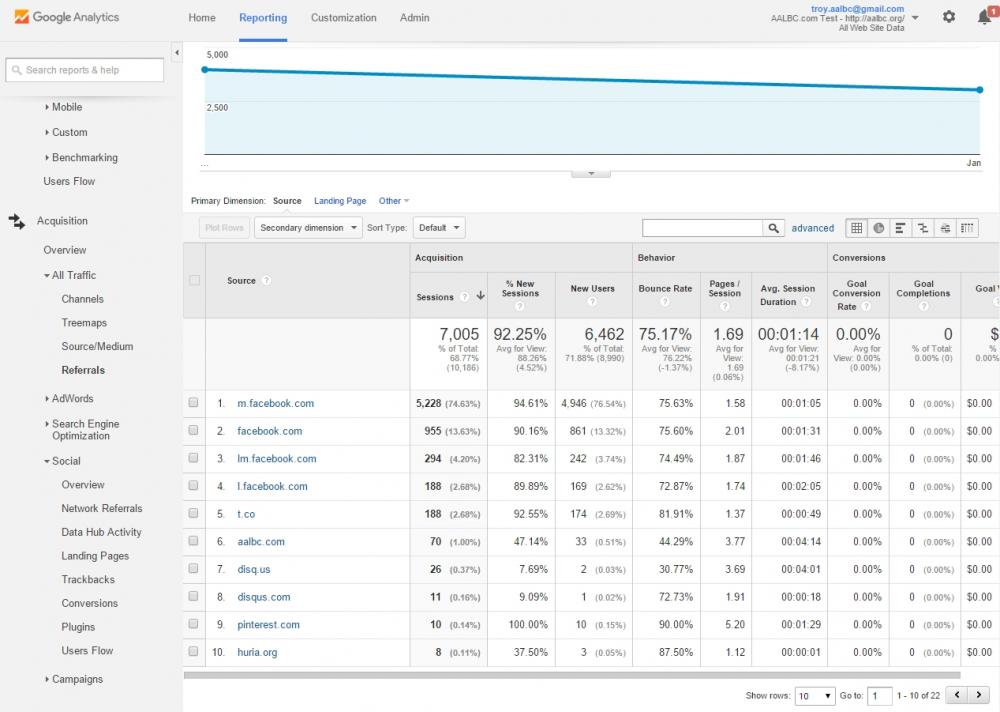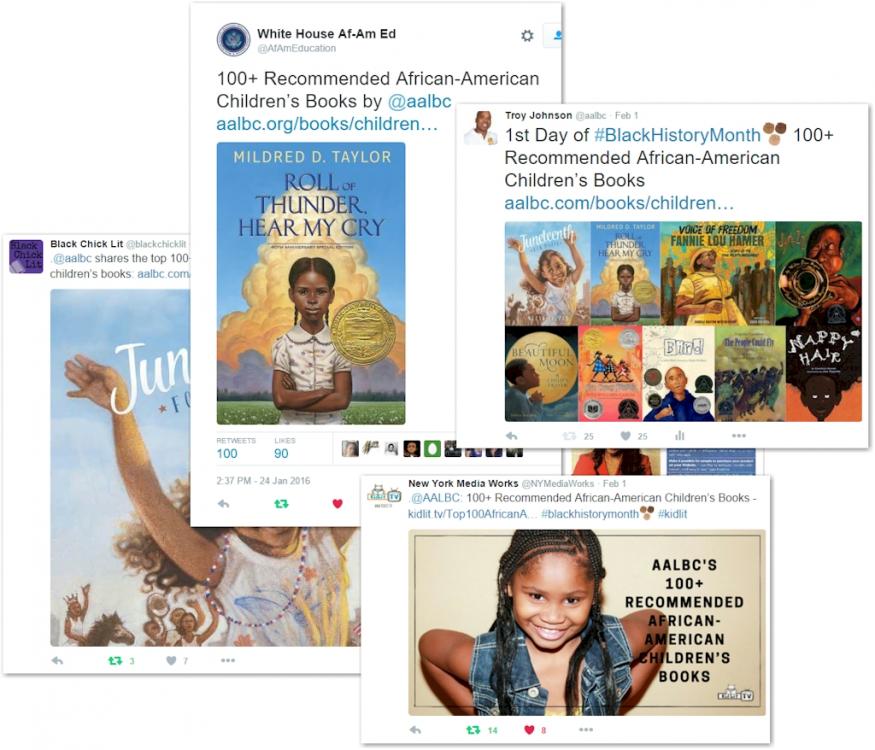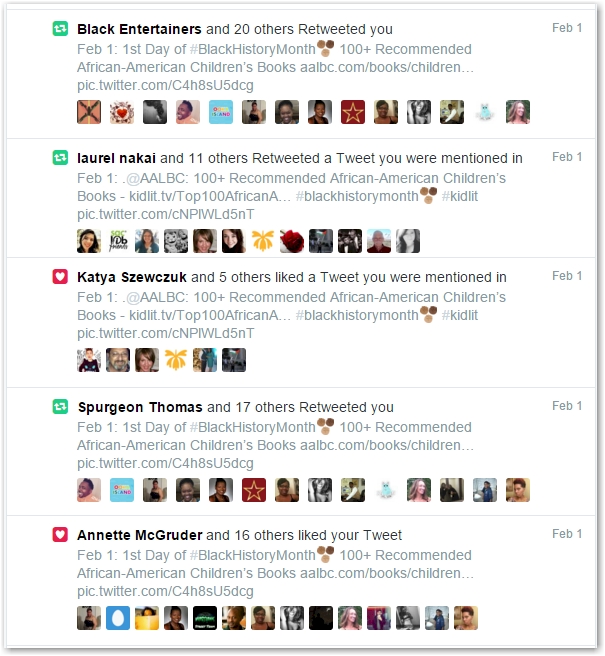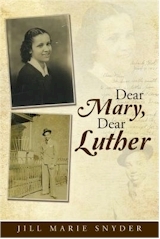-
Posts
13,111 -
Joined
-
Last visited
-
Days Won
715
Content Type
Profiles
Forums
Blogs
Events
Everything posted by Troy
-
Black Issues Book Review was the only large circulation magazine devoted to books written by black authors. I talk about this magazine often. William Cox had sold it to the Brother that runs Target Market News, Ken Smikle. It is curious Ken does not mention this on his website's biography. At any rate by the time the magazine died, the surge in attention paid to Black books was already in run downswing. There are some indications that the pendulum is beginning to swing back as there seems to be renewed interest in Black books. 15 days down 351 to go :-)
-
It was interesting that the artist led with “I'm a white artist...” I'm not sure what his intent was when he provided that information. Was I supposed be more impressed? Was it done to preempt any negative reaction were I to discover his whiteness later? If I were white, I would he have used the same introduction? Obviously he shares his art with Black people who fight racism, but does he share it with the white racist who actually need it to hear the message? I did invite the artist to comment on his work here, perhaps those questions would be answered. I chose to use, Michael D’Antouno’s tactic to introduce his work here. In today's racist culture, perhaps it is salacious enough to attract attention to his message In any event the art speaks for itself.
-
I decided today to add all major book events, not just Black ones, that I could find to my Book events listing. I think it one of a kind. There are plenty of places that lists book events, but none also list Black events. My list includes book and literary festivals from across the country. Have about 100 in in my database, some have already occurred, and others have not posted there 2016 data, so they are not showing, but right now I have 75 events listed. Check out the list at http://aalbc.com/events/ I plan to provide a list suitable for printing, but I'm looking for some feedback on what I've done so far. Also, am I missing any important events? Let me know what you y'all think. Also take a look at the participating authors at these events. What conclusions can you draw? Occassionaly some well meaning white person will ask me some variation of the following; "If there was an event that was called the National White Book Festival, that would be considered racist, but you all can have a Nation Black Book Fair, why isn't that racist?" Again, let me know what you all think.
-

African-Americans No. 1 in Media Consumption
Troy replied to Mel Hopkins's topic in Culture, Race & Economy
OK It must be getting late I read the article twice and completely missed the methodology so prominently placed at the end of the article I'll look at this again tomorrow. I will say any data collected at an Essence Festival would be VERY biased. Have you ever been to an Essence Festival? LOL! -

African-Americans No. 1 in Media Consumption
Troy replied to Mel Hopkins's topic in Culture, Race & Economy
200 hours is more time than someone working 40 hours a week would spend on their job. There are many homes I visit where the TV is playing and no one is watching it. I know a lot of people who sleep with the TV on--one lady I talked to about this needs the TV on to fall asleep. Some people still keep TV's one to even when they are not home to give potential burglars the impression someone is home. This is purely anecdotal of course, but since Nielsen no longer hands out surveys I presume they are collecting the data by monitoring our viewing habits which is data that is easily obtained now that we all use view TV broadcasts over some digital network. The article did not discuss the methodology used to collect the information. I suspect what Nielsen is capturing is a cultural bias, where Black folk happen to have the TVs on longer, and not being watched, so the perspection is we are watching them longer. As far as smart phone usage is concerned that makes sense because for many Black folks the cell phone is there only form of Internet access. We don't talk about it much any more but there are A LOT of Black people who don't have PC's or laptops at home, and their cell phone is their primary method for access the internet. Which may explain why Black folks disproportionately use Twitter. The stats about newspapers readership baffles me. I subscribe to newspapers and read them, but I don't know very many other people who do. They read, but it is typically online... -
Where is the midpoint between ATL, NYC and Memphis? We should host an conference, a real roll-up the sleeves combine to hash some of these issues out. We all know an least two who would be interested in doing this maybe we get the ball really rolling. I've been part of similar efforts that went no where, but Mel is fired up and Chris is not too jaded yet :-) I think our group we can actually make something happen. Over the long term. Maybe over the Summer? What do you think?
-
This was shared with me on Twitter today You know artists have always been an important part of the struggle. This image below was also part of the tweet. I think the analogy is valid.
-
14th Day of #BlackHistoryMonth 2/14/16 Dr Jawanza Kunjufu author of The Conspiracy to Destroy Black Boys
-
Hey Mel I just updated my initial message (for syntax and clarity). It had not occurred to me but that link you provided would be a good springboard to other blogs as well.
-
You know I hot the main page of Chasties' sites started reading and was drawn into the story then bam! "...here is your book..." then we are presented with the cover. I actually think that is a good intro to the book. I would get rid of the social buttons -- there is nothing happening on any of these platforms. I have never seen a twitter account with only one follower. Some folks would consider that embarrassing :-) You absolutely need a call to action showing how people can purchase the book. Make it easy for folks. Finally you can probably Blog all day about your teaching experiences. I would be careful not to simply show a parade of dysfunction, but do more of what you did on your homepage present a problem and demonstrate how you solved it. That is what is inspiring and should resonate with people--they will want to support your efforts.
-
You know that makes sense to push these types of selections directly to people most likely to use it. Just posting it on social media, or even here, and expecting it to just be discovered will not work. I will publish monthly updates of the links I posted. I hope this link will have legs beyond the daily posts.
-
Again I have no problem with, and will encourage visitors, to share links to our content on Social media. So I will keep the social buttons to facilitate that sharing. Indeed I will share from here myself. You just will not catch me engaging on social media. If all content providers did this social media would not be able to exert so much control over the net
-
-
Back on the 23rd of January I shared a link to a page on my test site called, "100 Top Recommended African-American Children's Books." This is list really part of an overall strategy to increase my focus on children's books. At the time there were 70 something titles on the list; I was interested in getting more feedback on the page's layout as well as suggestions from others on additional titles. I posted a link on Facebook and it was shared over 1,700 times. The posts were also shared on Twitter, Google+, and Pinterest. These are the 4 social media platforms that I regularly post to. The reaction on Twitter was just as strong. I notice one site customized and created a post about the list, and gave complete credit to AALBC.com with clear hyperlinks back to this site--a very unusual, but positive action. Each day, over the two day period shown, there were more than 3,000 new visitors to the AALBC.com test site. Prior to this the website was getting 300 hundred visitors a day. This was all direct traffic. While the site was in the Google's index it was not getting any traffic from search. Because virtually all of the traffic to the site was due to this post, this gave me a rare opportunity to examine, in detail, how well social media performs in terms of generating traffic back to my web site and even in generating book sales. The Google Analytics screenshot below reflects the sources of traffic on my test site. You can see that 95% of the traffic to the test site came from Facebook and less that 3% from Twitter. I immediately consolidated the test site into AALBC.com proper, something I did not plan to do until the spring, but I was concerned about AALBC.org, creating confusion not just to users but to Google's Search engine. After migrating the test site to AALBC.com (a NON-TRIVIAL acitivity I assuure you), I reshared the chidlrens book list. The activity on the Twitter side continued even more strongly Below is just a sample of the updates I would get from Twitter on folks who shared or retweeted the page. My kid texted me from her job saying that she got a message from Twitter telling her that the post was trending. She also warned me that the link was wrong; it said aalbc.org instead of aalbc.com. I explained to her that it was not a problem (the non-trivial task was worth it). The link has been circulating on social media for about three weeks now. I can see the half-life is about a week. In other words the traffic generated to AALBC.com from all of social media for this post descreased approximately by half each week. The graph chart below shows the traffic from all of social media to the "100 Top Recommended African-American Children's Books" page from Jan 23 to the morning of February 12. As you can see there were a total of 18,851 visitors to the website--virtually all of them came from Facebook. The tremendous about of engagement on Twitter did not translate into very many visits. All of the engagement on Twitter benefited Twitter more than it did this site. This is not news to me as I've written a great deal about "likes" and "shares" not translating into traffic. But this case really illustrates the point in a stark fashion. Twitter simply does not benefit my platform. Sure it is great to have 552 visitors that I would never have had, but look what it takes to get it. I also get tons of repins on Pinterest but even this viral post generated almost no referral traffic from Pinterest. Google+ is not much better. If either platform (Pinterest or Google+) benefits the AALBC.com brand I have no way to measure it. Book Sales There was indeed a surge in book sales. The majority of these sales were made by people on mobile devices. if you look carefully at the Google Analytics chart, I shared above, you will see that almost 75% of the visitors (5,228 total) were Facebook mobile users (m.facebook.com). Naturally, the mobile users dominated sales. Conclusions My initial posts on social media did NOT generate all of the engagement and resulting traffic; it all come from people who shared it and even more who reshared those shares. We benefit most from social media when we support each other naturally, organically. Organic reach is far more powerful than paid or promoted social media posts. I've never seen this much engagement from a promoted post. Plus, needless to say, it is a whole lot cheaper. The underlying content has to be of interest. Children's Books have been in the news lately, it is Black History Month, and frankly people love lists. The new website design will allow me to go to town with lists. Yesterday I published QBR's 100 Essential Black Books, tomorrow I'll share 25 New Books by African Writers. Will any of these pages gain as much traction as the children's book list, I doubt it, but I does not need as AALBC.com is more than one page of content. It is the collection of content here that will attract visitors over the long haul. One of the reasons I'm upgrading this site it to optimize it for mobile users. I see clearly why this is so important: since the site is optimized for mobile; making the book purchase, directly on the site, is easy for the reader. As a result, this site earns more commissions on book sales. Examining your site's traffic is so important. If I never looked at my website traffic I would never have known that all of the Twitter engagement led to very little traffic and zero book sales. The week long half-life for the "100 Top Recommended African-American Children's Books." list is actually a lot longer than I'm accustomed to seeing. Typically a single day half life is normal. This subject has legs right now and is supports my designed to provide more content in this area. Finally, this is why websites are important. I could have posted the list of books directly on Facebook and it would have looked something like this (at best); A is for Activist by Innosanto Nagara (2013-11-19) A Weed Is a Flower : The Life of George Washington Carver by Aliki (1988-04-15) Afro-Bets 1-2-3 Book by Cheryl Willis Hudson (1989-02-16) Amazing Grace by Mary Hoffman (1991-09-02) And the Sun God Said: That’s Hip by Ernest Gregg (1972-01-01) Baby Says by John Steptoe (1988-04-20) Bad News For Outlaws: The Remarkable Life Of Bass Reeves, Deputy U. S. Marshal by Vaunda Micheaux Nelson (2009-09-01) Beautiful Moon by Tonya Bolden (2014-11-04) Bird by Zetta Elliott (2008-10-28) Black Mother Goose Book by Elizabeth Murphy Oliver (1981-09-17) Oh and there would have been no hyperlinked text. I'm noticing that many entities are abandoning maintaining websites in favor of Facebook pages. I've also been reading about content providers agreeing to publish content for consumption directly on Facebook. If this trend continues I think it would be disastrous on more levels than I can describe now. It is hard to imagine that this is happening in an environment when running and maintaining a website has never been easier or cheaper. Another reason I upgraded my website was to move it from a server which was costing me $90 a month, to one which costs me $14.99 a month. It could run AALBC.com on a website that costs less than $30 a year--inlcuding domain name registration. There is NO reason for Facebook to be anyone's primary platform. After my 366 days of Black History campaign, I'm going to stop posting to all social media. I will support anyone that shares content on social media on AALBC.com's behalf, but I just will; not post. Social media, like this very discussion forum needs people to participate in order for it to be valuable. If I'm constantly posting there why would people come here?
-

Case Study of a Successful Author's Social Media Campaign
Troy replied to Troy's topic in Bloggers Helping Bloggers
Brilliant exchange Mel and Chris. My struggle to keep this forum alive so that dialogue like this can emerge is well worth the effort. Mel your media pitch for Chris is priceless. Chris being a celebrity, or having a celebrity cosign, can definitely help, but it is insufficient (unless you are Kanye West) for something to go "viral" on Twitter. I've had both Cornel West and Tavis Smiley retweet one of my posts and it went no where. A recent tweet of mine,100+ Recommended African-American Children’s Books, that did go "viral" did not have a celebrity cosign (as far as I can tell), but it resonated with more people. White House Af-Am Ed (@AfAmEducation) Retweeted and their retweet was retweeted 100 times-- and that was just one of many. People love lists, and the recent hullabaloo over the racist children's book, A Birthday Cake for George Washington, was still fresh in people's minds. So the tweet got some traction--but only on Twitter! Here is the kicker: Virtually no one from twitter visited the website (this will be the subject for a different case study). Mel I do believe there was a time, when we had a stronger, independent Black media, that the coverage of folks like Chris and myself would have come much easier. This is purely anecdotal, but 10 years ago I, and many of my peers, used to get much more media coverage--without having to develop the angle, pitch the idea, and essentially hand them the whole thing on a silver platter. I also know that much of what we do see in the media did not get there organically, but is part of an orchestrated effort by media professionals, PR experts, advertising executives, etc. I think part of the frustration Chris feels is that his being "...the only Black owned shoe company in the US actually selling shoes..." should be newsworthy in and of itself. I think 10 years ago a Black Enterprise would have been more likely to pick up his story with a PR professional, than they would be today. Of course there were always PR firms, but it seems today the content they promulgate crowds out everything else that does not have a PR machine behind it. If you look at what proliferates on the top Black websites, much of the content is the same. -
Hi Jill thanks for visiting our forum. Yes Carol did write highlightly of your book in her review. The link above was broken, but I added an interview I found below (this is you right?). I also added it to your web page. Can you provide a short description of the interview so that I can add it to you page as an intro. Your browser does not support the HTML5 audio element.
-
@Xeon, once March comes I'll see if anyone notices that I'm carrying Black history month beyond February and what the reaction is.
-

Case Study of a Successful Author's Social Media Campaign
Troy replied to Troy's topic in Bloggers Helping Bloggers
"Marketing is not PR and PR is not Social Media... and none are SALES" good point @Mel Hopkins The real challenge is how does an unknown (non-celebrity) writer use social media to develop relationships which would ultimately lead to the potential to soft sell of a book? Keeping in mind that the time and energy that goes to social media must be taken away from some other activity. How does one create an efficient and productive balance? A couple of years ago I did a quick analysis of the twitter accounts of the top earning authors. Some of the authors like Suzanne Collins, Nora Roberts, and John Grisham did not even have twitter accounts. Most of the others, with accounts were inactive. J.K. Rowling only Tweeted 29 times despite have over 2 million followers. This was two years ago, if I had more time I'd revisit the analysis. Some additional interesting stats I collected at time included; 90% of internet users don’t use Twitter One-quarter of all tweets, are generated by software (automated tweets, not initiated manually by a human) 5% of Twitter users account for 75% of all activity 93.6% of Twitter users have less than 100 followers 1 in 10 Twitter users don’t follow anyone 92.4% follow less than 100 people 6 out of 100 twitter users have no followers 25% of Twitter users have never tweeted 0.29% of overall Twitter users who follow more than 2,000 people This was two years ago, so I'm sure these numbers have changed, but at the time I questioned whether avid readers would be very active on Twitter. I still question that. My own experience tells me that Facebook is more fertile ground for reaching readers that Twitter, despite Facebook making it increasingly more difficult to reach these users over the past year. -
While I'm glad the kid in Beasts got some recognition during the image awards that is not enough for me to lift my boycott of the NAACP Image awards. GIven the critical acclaim of the film Straight Outta Compton I can't help but feel manipulated in wanting to see it. Could it really be the best film made last year? I guess 2015 was a relatively weak year for Black film.
-
I've saw Max Max, and that was because my kid borrowed it from the Library. I did not particularly care for the film and was surprised by the critical acclaim. I also saw was Beasts of No Nation, a very moving film. I'm surprised the kid who played the character, Agu, Abraham Attah, has not been given more acclaim. His performance was as good if not superior to the Quvenzhané Wallis' (Hushpuppy in Beast of the Southern Wild). The only other film on the list that I saw was Martian. It is available on Netflix or one of the streaming services. It was an excellent film. Chi-raq generally elicits un favorable remarks from anyone I ask you has seen it. I will see Straight Outta Compton and a few of the others when they are available for for free streaming. I never heard of the The Danish Girl or Carol. I looked them up and I see why. I did not see any of them films in the theater, but I see less than a handful of moves a year in the theater nowadays.
-
AFRICAN-AMERICAN FILM CRITICS ASSOCIATION NAMES STRAIGHT OUTTA COMPTON AS TOP FILM OF 2015 FOR IMMEDIATE RELEASE AFRICAN-AMERICAN FILM CRITICS ASSOCIATION NAMES STRAIGHT OUTTA COMPTON AS TOP FILM OF 2015 Will Smith, Teyonah Parris and Ryan Coogler Also Receive Wins from the Nation’s Premiere African American Critics Group The Danish Girl and Mad Max: Fury Road also take key honors Los Angeles, CA (December 7, 2015) – Movies that reflect the revolutionary undercurrent running through society dominated this year’s voting for the 7th AAFCA Awards. Straight Outta Compton, the surprise summer box office hit centered on the 90’s rap group N.W.A., captured an overwhelming majority of the votes cast by members of the association. The Universal Pictures film earned multiple awards for Best Picture, Best Ensemble and Best Supporting Actor for Jason Mitchell, who portrayed the group’s founder, Eazy E. Awards were also given to Creed in the category of Best Director for Ryan Coogler; Michael B. Jordan for Breakout Performance and Tessa Thompson for Best Supporting Actress. The top acting honors went to Will Smith and Teyonah Parris for their roles in Concussion and Chi-Raq. AAFCA will hold its 7th annual awards ceremony on Wednesday, February 10, 2016 at the Taglyan Complex in Hollywood, CA. “Our members found an interesting theme in many of the films released this year, giving a voice to communities who have generally been underserved and marginalized in society,” says AAFCA president Gil Robertson. “With movies like Straight Outta Compton, Chi-Raq, 3 1/2 Minutes and Dope, filmmakers brought to life many storylines that are a reflection of what’s happening in our world today, including the #BlackLivesMatter movement. Pictures like Carol and The Danish Girl, give voice to another community that is too often ridiculed and ignored by the status-quo. With Creed, the members of AAFCA found an opportunity to celebrate a film with “a” universal message of hope, honor and perseverance – something that everyone can embrace. Overall, it was a transformative year in cinema.” The following is a complete list of 2015 AAFCA Awards winners. Best Picture: “Straight Outta Compton” (Universal Pictures) Best Director: Ryan Coogler –“Creed” (Warner Bros.) Best Ensemble: “Straight Outta Compton” (Universal Pictures) Best Actor: Will Smith “Concussion” (Sony) Best Actress: Teyonah Parris “Chi-Raq” (Roadside Attractions) Best Supporting Actor: Jason Mitchell “Straight Outta Compton” (Universal Pictures) Best Supporting Actress: Tessa Thompson “Creed” (Warner Bros.) Best Independent Film: “Chi-Raq” (Roadside Attractions) Best Screenplay: Rick Famuyiwa, “Dope” (Open Road Films) Breakout Performance: Michael B. Jordan “Creed” (Warner Bros.) Best Animation: “The Peanuts Movie” (20th Century Fox) Best Documentary: “A Ballerina’s Tale” (Sundance Selects) Best Song: “See You Again” Furious 7 (Atlantic Records) Best TV Comedy: “Black-ish” (ABC) Best TV Drama: “How to Get Away with Murder” (ABC) Best Cable/New Media TV Show: “Survivor’s Remorse” (Starz) AAFCA Top Ten Films of 2015 are as follows in order of distinction: 1. Straight Outta Compton (Universal Pictures) 2. Creed (Warner Bros.) 3. Mad Max: Fury Road (Warner Bros.) 4. Beasts of No Nation (Netflix) 5. The Martian (20th Century Fox) 6. 3-1/2 Minutes/Dope (HBO/Open Road Films) 7. Chi-Raq (Roadside Attractions) 8. Carol (Weinstein Co.) 9. The Big Short (Paramount Pictures) 10. The Danish Girl (Focus Features) As previously announced, AAFCA’s Special Achievement honors will be awarded to Codeblack Entertainment CEO, Jeff Clanagan; director John Singleton; Maverick Carter and LeBron James’ SpringHill Entertainment. New York Times film critic, Manohla Dargis will receive the organization’s Roger Ebert Award and HBO will receive the group’s Cinema Vanguard Award. About AAFCA The African-American Film Critics Association (AAFCA) is the premiere organization of African-American film media professionals. Founded in 2003, AAFCA’s members represent a geographically diverse cross-section of media covering the cinematic arts. The organization honors excellence in cinema by creating awareness for films with universal appeal to black communities, while emphasizing film about the black experience and those produced written, directed and starring performers of African descent. The association actively reviews the quality and standard of black talent, content and media coverage. AAFCA also supports the development of future black film critics and filmmakers. AAFCA is based in Los Angeles. CONTACT: Jeaunine Askew 323-878-2399 | info@aafca.com
-
The this morning I received an email from a publicist, touting a book that has nothing to do with the demographics of the website. The message was however well written and while I did not reply to the message, I did check out the website of the domain from where the email was sent. I was interested in the services they provided to help authors reach book clubs. The is an excerpt from the first case study I read on the website (This case study has nothing to do with the book mentioned in the original email I recieved). "Results: In the six short weeks that we worked with Whitmore, she blossomed from an author with no social media experience to one with a mastery of her blog, Facebook, and Twitter who was capable of building her own audience without our help. We launched the campaign with zero followers on each of the three accounts and finished our six-week campaign with more than 300 followers on Twitter, 104 likes on Facebook, and 540 views per month on her blog with 33 blog followers. Whitmore continues to be active on all three platforms and has grown her Twitter following to nearly 450 followers." You may read the full case study here. It was published on December 2014. Even though the author started from scratch, the numbers aren't particularly impressive--certainly not worth boasting about in a case study as a pitch to other potential clients. However, given that these numbers were posted two years ago I thought it was be a great case to review to see what the long term impact of this social media campaign. So I checked out the author's account to see how they have grown. After two years here is what I found; Facebook: 18 additional likes on Facebook. The authors posts sporadically, an average of twice a month over that last 6 months. None of the posts have anything to do with her writing and most posts get no likes. She averages 0.5 likes per most over the last 6 months with zero comments. I would strongly recommend this author remove her Facebook page). The link to her website on Facebook points to a broken URL. When I do a google search on the author's name, Jan Whitmore, Facebook comes up first. (This is a Google problem that I wish they would fix.) Twitter: there are 51 additional followers on Twitter (less than 2 new followers a month). The author is active on Twitter tweeting on average 3 times a day since the account was created. Looking at the tweets from the past two months there is no shares, no retweets--virtually no engagement. The Blog: The authors blogs infrequently the most recent Blog post was last September. The Blog is part of a website that describes her mission, but could benefit from some SEO. The site is not getting enough traffic to even have an Alexa ranking. At first glance, it does not appear that the author is very interested in selling her books, but that stands at odds with the fact that she contracted (apparently) the services of a full service PR & Advertising Company. Bloggers in particular really need to understand what their goals are when they engage on social media. In this author's case the neglected Facebook page is causing more harm than good, because it is ranking higer than her website, in search, and most the important information, her website address is wrong. None of her social media spoke about her books or her Blog. I would not have known that she was an author with any interest in selling books if my first exposure to her was through her social media platforms. Aside from hiring a PR firm, this example is no different than many others I encounter on a daily basis--most far worse. For many authors are abandoning websites in favor of a Facebook pages. It appears the only beneficiaries in this case study are the social media platforms and the PR firm.
-
OK Sara you obviously ignored my very simple question about the percentages you provided, because you don't have answer. Indeed there is no logical answer, because what you wrote makes no sense. I was hoping my question would help you see the problem with your conclusion, but I overestimated your reasoning ability.
-
I'm sorry @Sara, but you are indeed misinterpreting the information. Let's try a more Socratic approach: Sara, you presented the following percentages which, according to you, is a breakdown of the percentage of students enrolled in college. Again, you are asserting that Black women, at nearly 9%, make up the largest race/gender demographic in college enrollment.. Black female 8.7% Asian female 8.6 White female 7.1 Black male 7.0 Hispanic female 6.6 White male 6.1 Hispanic male 5.9 Now if you add these percentages up we get a total of 50% Please tell me what demographic makes up the remaining 50% of the students enrolled in college?

